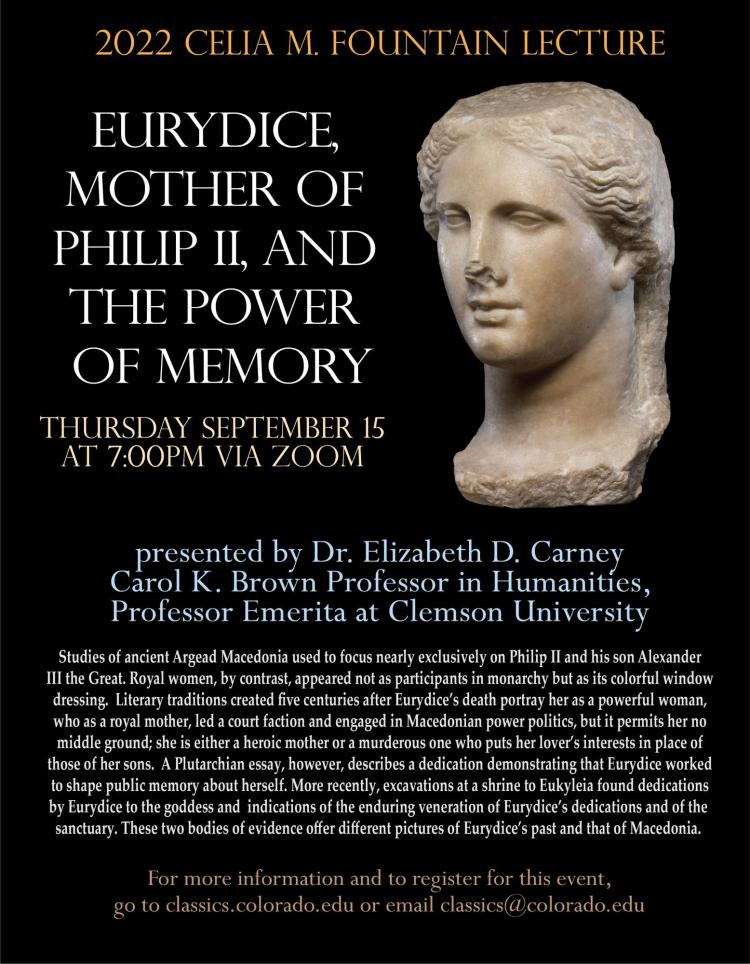Fountain Lecture: "Eurydice, Mother of Philip II of Macedon, and the Power of Memory"
The Celia M. Fountain 2022 Webinar
Eurydice, Mother of Philip II of Macedon, and the Power of Memory
Professor Elizabeth Carney
Thursday, September 15, 7:00 p.m. on Zoom
Free and Open to Public
REGISTER HERE

ABSTRACT
Study of ancient Argead Macedonia used to focus nearly exclusively on Philip II and his son Alexander III the Great. Daily life, social and religious practices, and material culture got little attention, especially in connection to the political world. Royal women appeared not as participants in monarchy but as its colorful window dressing. Heavy dependence on literary sources generated narrow readings of the Macedonian past. What little that was known about Eurydice, mother of Philip II and grandmother of Alexander the Great, depended on works created and perpetuated by the tiny literate class of the ancient world, works largely written about five centuries after Eurydice’s death, providing Roman, only indirectly Macedonian, memory of Eurydice.
This literary tradition portrays Eurydice as a powerful woman, who as a royal mother, led a court faction and engaged in Macedonian power politics, but It permits her no middle ground; she is either a heroic mother or a murderous one who puts her lover’s interests in place of those of her sons. A Plutarchian essay, however, does preserve an inscription, once associated with a dedication, that demonstrates that Eurydice worked to shape public memory about herself.
That is all we knew about Eurydice until, at Vergina (a modern village, almost certainly the site of ancient Aegae, the older Macedonian capital and burial place of the Argead kings), the first archaeological information about Eurydice emerged in 1982 when Chrysoula Saatsoglou-Paliadeli and her team began to excavate an area now known as the sanctuary of Eucleia. They found dedications by Eurydice to the goddess Eucleia and, nearby, other evidence of Eurydice’s presence in Aegae. Gradually, they uncovered indications of the enduring veneration of Eurydice’s dedications and of the sanctuary, veneration that continued into the first century CE, nearly four centuries after it began. This archaeological evidence derives, primarily, from the actions of Eurydice herself and from the practices (architectural, religious) of centuries of Macedonians. These two bodies of evidence about Eurydice—literary and archaeological-- offer different pictures of Eurydice’s past and that of Macedonia. This physical evidence indicates how memory of Eurydice, her family, the Argead dynasty, and the Macedonian kingdom, evolved: It gives us a more Macedonian Eurydice. Over time, however, the sanctuary acquired other layers of meaning; it encompassed memory and veneration of a lost and grander past and of the family that helped to bring about that grandness and yet it also linked that past grandeur to a less grand present. Relatively soon after Eurydice’s death, the sanctuary may have become a place for the secret burial of the very last Argeads. The structures of the sanctuary doubled in size under the new Antigonid dynasty, in a way that highlighted Eurydice’s dedication. After the Roman conquest the sanctuary endured as other cults at Vergina faded away. When whatever event in the early first century CE caused the city to be abandoned, those still possessing some wealth and power, as well as nostalgia, organized an elaborate burial and funeral feast for the remains of the Eucleia cult and the dedications of its most famous patron.

